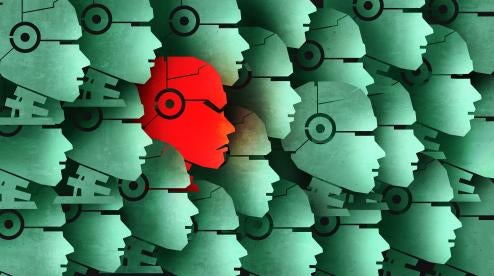She noted that synthetic intelligence (AI) “holds nice promise to enhance our lives — however nice peril when criminals use it to tremendous cost their unlawful actions, together with company crime.” She cautioned people and firms that “[f]raud utilizing AI continues to be fraud.”
AI and machine studying (ML) have enabled exceptional developments within the monetary know-how (Fintech), banking and finance, and healthcare industries. The buildup of mass information — massive, advanced, fast-moving, or weakly structured information — in these industries make them ultimate settings for AI empowered improvements. Within the finance and banking sectors, mass information empowers AI and ML to rework providers, introducing automated buying and selling, threat administration, customer support through chatbots, and predictive analytics for future market tendencies. In Fintech, AI and ML have performed an important position in creating cryptocurrencies, algorithmic buying and selling, and blockchain applied sciences. In the meantime, in healthcare, “[m]achine studying algorithms are used with massive datasets equivalent to genetic info, demographic information, or digital well being data to offer prediction of prognosis and optimum therapy technique.”
As industries embrace these AI applied sciences and a bunch of revolutionary software, closely regulated industries will face an more and more advanced panorama of legal responsibility, regulation, and enforcement. Deputy Legal professional Basic Monaco’s latest remarks emphasize the federal government’s demonstrated urge for food to pursue legal responsibility for many who fraudulently oversell their AI software’s capabilities or fraudulently exploit their AI software’s capabilities or the information that drives it. Latest enforcement actions within the FinTech business are useful illustrations.
For instance, authorities authorities have pursued civil and felony fraud costs for people or companies who make fraudulent statements regarding AI and ML capabilities to draw traders. Notably, the US Securities and Exchange Commission (SEC) charged Brian Sewell, an internet crypto buying and selling course proprietor, for allegedly deceptive college students into investing over $1 million in his hedge fund, which he claimed would use AI and ML. As an alternative, he held the funds as bitcoin till his digital pockets was hacked. Equally, the US Department of Justice (DOJ) charged David Saffron and Vincent Mazzotta for allegedly inducing people to spend money on buying and selling applications by falsely promising AI-driven high-yield earnings. In line with the DOJ, as a substitute of investing victims’ funds in cryptocurrency, the defendants allegedly misused the funds for private luxurious bills.
Within the healthcare business — the main supply of false claims act circumstances — the government is conversely concerned with firms understating an AI software’s capabilities or exploiting AI functions to defraud sufferers and authorities healthcare applications. For example, if a pharmaceutical manufacturer has a monetary curiosity in a ML pushed digital medical data software program, if the output informs (or induces) the well being care supplier’s final resolution, is the anti-kickback statute implicated? Or, if an AI/ML software suggests pointless or inappropriate healthcare gadgets or providers and the federal government receives a declare for the providers, has a False Claims Act violation occurred?
As using AI permeates industries, closely regulated industries can count on to see extra authorities perception and enforcement. In truth, US Deputy Attorney General Lisa Monaco stated, “Like a firearm, AI can improve the hazard of a criminal offense,” and thus, the DOJ will search harsher penalties for offenses made extra dangerous by the misuse of AI. Additional, in recent remarks before Yale Law School, the chair of the SEC promised that those that use deploy AI to promote securities by fraud or misrepresentation ought to count on “struggle with out quarter.” In February 2024, the FTC additionally proposed a new rule that may “it illegal for a agency, equivalent to an AI platform that creates photographs, video, or textual content, to offer items or providers that they know or have cause to know is getting used to hurt shoppers by impersonation.”
In the meantime, the federal authorities continues to make the most of its personal AI and ML improvements to implement anti-fraud rules and detect and examine fraud and abuse. Companies just like the IRS, FinCEN, HHS, and DOJ use AI and ML for usually laborious and human error inclined duties equivalent to detecting fraud, tracing unlawful medicine, and understanding suggestions acquired by the FBI. In truth, utilizing an AI empowered fraud detection course of, the U.S. Division of the Treasury reported that it recovered over $375 million within the 2023 Fiscal 12 months.
In gentle of the federal government’s elevated scrutiny of AI and ML in regulated industries, it’s essential that firms’ management work intently with their innovators to make sure that using AI and ML don’t run afoul of the present and burgeoning rules. Business leaders, normal counsel, and compliance officers needs to be significantly cautious if the findings of a Berkeley Research Group survey of healthcare professionals are a bellwether for different closely regulated industries: 75% of all healthcare professionals surveyed anticipated using AI to be widespread inside three years, whereas solely 40% of well being professionals reported that their organizations plan to overview regulatory steerage on AI.
Within the coming years, the federal government and industries will undoubtably proceed to make the most of and develop AI and ML to realize higher outcomes, detect felony or fraudulent conduct, improve employee productiveness, and maximize benefits. Nevertheless, as Deputy AG Monaco warned, firms’ compliance officers and normal counsel should even be ready to “handle AI-related dangers as a part of [the company’s] general compliance efforts. The way forward for AI and ML in regulated industries guarantees to be a dynamic and evolving panorama, however it requires savvy authorized, regulatory, and compliance knowhow to keep away from going through legal responsibility for AI-enabled fraud.


